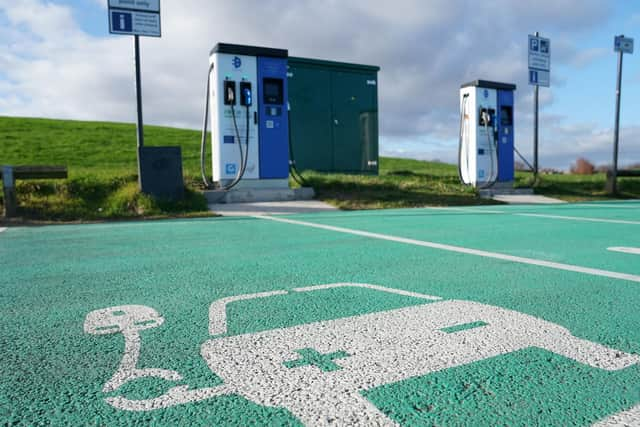Government could bring in 'vehicle revolution within the next five years' with electric vehicle plans, Yorkshire MP says
Don Valley Conservative Nick Fletcher yesterday pointed to a “California-style zero-emission-vehicle mandate, which would require manufacturers to sell more electric or hydrogen vehicles each year”.
And during a debate in Parliament he said companies that did not maintain charging points should be hit with fines.
Advertisement
Hide AdAdvertisement
Hide AdMr Fletcher, who is a former electrical engineer and owner of an electrical company, said the cost of electric vehicles (EVs) was now matching those which were petrol or diesel, with running and servicing costs much cheaper.


And he urged ministers to “remove some of the existing incentives in the automobile sector and reinvest the money into EV charging point infrastructure”.
“If cost is not holding us back, what is?” he said.
“Is it distance? Again, that used to be the case. However, most electric vehicles do much more than 200 miles now, and although that can drop in the winter months as batteries and occupants need to be kept warm, most vehicles will easily do 130 miles. As the average journey in the UK is less than 10 miles, range is not the big issue any more.”
The Government should work with the industry to make owning an electric car a much easier prospect, he said.
Advertisement
Hide AdAdvertisement
Hide AdAnd he suggested the “four stumbling blocks” currently stopping higher uptake of electric vehicles were “the lack of charging points, the size of those points, their unreliability and the lack of contactless facilities”.
He said that in order to invest in infrastructure, incentives on the cost of cars and home charging points should be scrapped.
For the former, he said prices were set to come down anyway, and the latter was too complex through a “complicated” voucher system.
“If those monies were redirected to further charging infrastructure projects, the automotive industry, which contributes much of our greenhouse gas emissions, could really lead the way to our net zero target,” he said.
Advertisement
Hide AdAdvertisement
Hide Ad“Some currently say that battery technology will get even better, while others stress that, while it will take time to get the charging points installed, they will come along eventually. I cannot stress how important it is that Ministers do not adopt that attitude, and instead move much more quickly.
“Why? It is obvious that fewer customers are buying electric vehicles due to that anxiety and the distance between charge points. That range anxiety is what is really stopping people buying these fantastic vehicles. The answer is to have high-powered rapid charging stations everywhere.
“A 300-mile-range vehicle with a high-powered charging can take as little as 20 minutes to give in excess of 150 miles’ charge. That is 75 miles in less than 10 minutes. That is obviously what we need—for EV charging points to be installed with the same frequency as petrol stations, well-lit and ideally under cover.”
He also said there should “be fines for companies that poorly maintain their charging points, and contactless payment must be mandatory”.
Advertisement
Hide AdAdvertisement
Hide Ad“If we do that, the take-up of such vehicles will be huge,” he added.
Transport minister Rachel Maclean said: “The transition to zero-emission vehicles is critical as [Mr Fletcher] said in helping us to meet our climate change obligations and in improving air quality in our towns and cities.
“That is why we are going further and faster to decarbonise transport by phasing out the sale of new petrol and diesel cars and vans by 2030; from 2035, all new cars and vans must be zero-emission at the tailpipe, putting us on course to be the fastest nation in the G7 to decarbonise cars and vans.”
She said: “The UK is already a global front-runner in supporting provision of charging infrastructure. Government and industry have supported the installation of nearly 20,800 public charging devices, including nearly 3,900 rapid devices—one of the largest networks in Europe.”
Advertisement
Hide AdAdvertisement
Hide AdShe said there were more than 1,000 points in Yorkshire, 311 of which were rapid charging.
But she added: “There is much more to do, and we will come forward with a number of plans and announcements on our infrastructure strategy to deliver the charge points that we need to underpin this transition.”
She added that although the grants were working, it was the Government’s position to move away from them as prices came down.